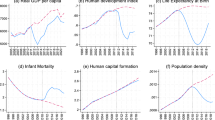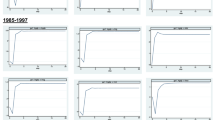Abstract
This paper assesses the political implications of financial reform in the People's Republic of China from the key reforms of 1994 to China's entry into the World Trade Organisation. It argues that the reforms implemented after 1994 in China shows a watershed in the evolution of economic reform. While the period before 1994 was dominated by dismantling the old system, subsequent reforms represent the attempt to build a new structure. But while the incomplete nature of reform provides the rationale for reform, it also provides the main obstacle to successful reform. Financial reform provides a case study of how the old and new economic systems are clashing with each other — and how the political interests associated with the old economic system are conflicting with those interests associated with the emerging new system.
Similar content being viewed by others
Author information
Authors and Affiliations
Rights and permissions
About this article
Cite this article
Breslin, S. Paradigm Shifts and Time-lags? The Politics of Financial Reform in the People's Republic of China. Asian Bus Manage 2, 143–166 (2003). https://doi.org/10.1057/palgrave.abm.9200031
Published:
Issue Date:
DOI: https://doi.org/10.1057/palgrave.abm.9200031




